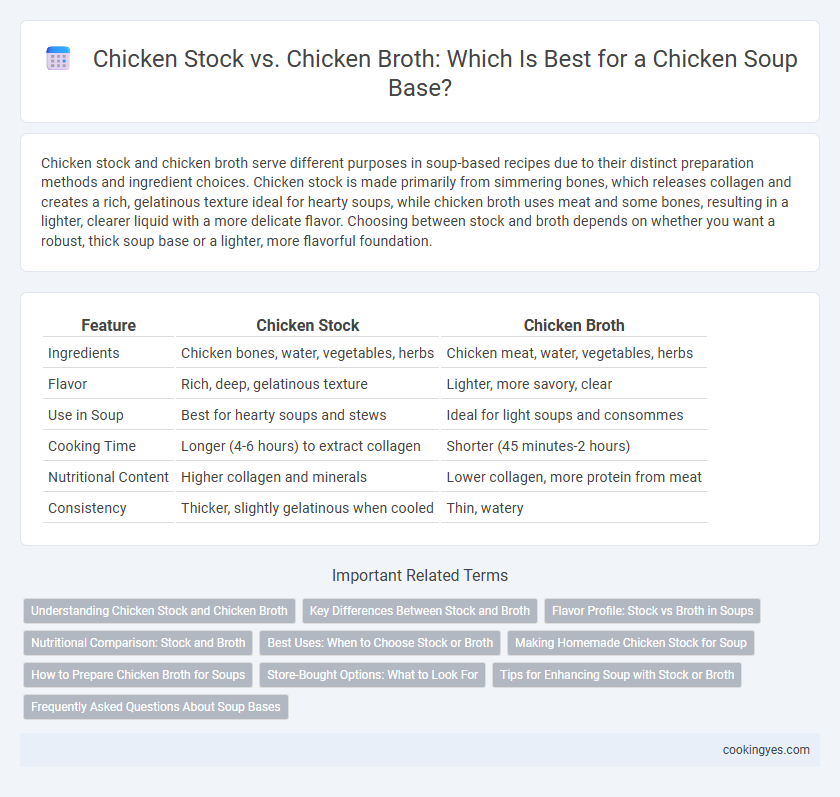Chicken stock and chicken broth serve different purposes in soup-based recipes due to their distinct preparation methods and ingredient choices. Chicken stock is made primarily from simmering bones, which releases collagen and creates a rich, gelatinous texture ideal for hearty soups, while chicken broth uses meat and some bones, resulting in a lighter, clearer liquid with a more delicate flavor. Choosing between stock and broth depends on whether you want a robust, thick soup base or a lighter, more flavorful foundation.
Table of Comparison
| Feature | Chicken Stock | Chicken Broth |
|---|---|---|
| Ingredients | Chicken bones, water, vegetables, herbs | Chicken meat, water, vegetables, herbs |
| Flavor | Rich, deep, gelatinous texture | Lighter, more savory, clear |
| Use in Soup | Best for hearty soups and stews | Ideal for light soups and consommes |
| Cooking Time | Longer (4-6 hours) to extract collagen | Shorter (45 minutes-2 hours) |
| Nutritional Content | Higher collagen and minerals | Lower collagen, more protein from meat |
| Consistency | Thicker, slightly gelatinous when cooled | Thin, watery |
Understanding Chicken Stock and Chicken Broth
Chicken stock, made by simmering bones with vegetables and herbs, offers a rich, gelatinous base full of collagen, ideal for adding depth and body to soups. Chicken broth is prepared primarily from meat and vegetables, resulting in a lighter, clearer liquid with a milder flavor profile that enhances delicate soup recipes. Understanding these differences helps cooks select the optimal base for texture and flavor intensity in various culinary applications.
Key Differences Between Stock and Broth
Chicken stock is made primarily from simmering bones, which releases collagen and results in a rich, gelatinous texture ideal for hearty soups and sauces. Chicken broth is prepared by cooking meat, vegetables, and seasonings, producing a lighter and clearer liquid with a more pronounced flavor. Stock offers a thicker consistency and deeper mouthfeel, while broth provides a more savory taste and is suitable for lighter soups and drinking on its own.
Flavor Profile: Stock vs Broth in Soups
Chicken stock offers a richer, more gelatinous texture with a deep, savory flavor due to the collagen released from simmered bones. Chicken broth provides a lighter, clearer taste derived primarily from meat and aromatic vegetables, making it ideal for delicate soups. For robust soup bases requiring body and complexity, stock is preferred, whereas broth suits recipes needing a clean, subtle chicken essence.
Nutritional Comparison: Stock and Broth
Chicken stock contains more collagen and gelatin extracted from bones, providing a richer texture and higher protein content beneficial for joint and skin health. Chicken broth, made primarily from meat and sometimes vegetables, tends to have fewer calories and less fat, making it a lighter option with a good source of vitamins and minerals like potassium and iron. Both provide essential nutrients, but stock offers more minerals like calcium and magnesium, while broth is typically higher in sodium and more hydrating.
Best Uses: When to Choose Stock or Broth
Chicken stock, rich in collagen from simmered bones, provides a thicker, gelatinous texture ideal for hearty soups and sauces requiring depth and body. Chicken broth, made primarily from meat and vegetables, offers a lighter, clearer base perfect for delicate soups, sipping, or recipes where a subtle chicken flavor is desired. Choose stock for richness and body, and broth for clarity and a milder taste in your soup preparations.
Making Homemade Chicken Stock for Soup
Making homemade chicken stock for soup involves simmering chicken bones, vegetables, and herbs for several hours to extract deep flavors and gelatin, resulting in a rich, hearty base. Unlike chicken broth, which uses meat and has a lighter flavor, chicken stock provides a fuller body and thicker texture, enhancing the mouthfeel of soups and sauces. Using homemade chicken stock elevates soup recipes by delivering concentrated nutrients and a robust, savory taste that store-bought options often lack.
How to Prepare Chicken Broth for Soups
Chicken broth for soups is prepared by simmering chicken bones, meat, and aromatic vegetables like onion, celery, and carrots in water for several hours to extract rich flavors and nutrients. Straining the mixture removes solids, resulting in a clear, flavorful liquid that serves as a versatile soup base. Adding herbs such as thyme or bay leaves during cooking enhances the broth's depth and aroma, making it ideal for various soup recipes.
Store-Bought Options: What to Look For
When choosing store-bought chicken stock or broth for a soup base, prioritize options with natural ingredients, no added preservatives, and low sodium content to maintain a clean flavor profile. Chicken stock typically offers a richer, gelatinous texture due to bone collagen, ideal for hearty soups, while chicken broth provides a lighter taste from meat and vegetables. Opt for brands that highlight organic sourcing and non-GMO certification to ensure premium quality and nutritional benefits in your soup base.
Tips for Enhancing Soup with Stock or Broth
Chicken stock provides a richer, gelatinous texture due to collagen extracted from bones, making it ideal for hearty soups, while chicken broth offers a lighter flavor derived mainly from meat and vegetables. Enhancing soup with stock involves simmering with aromatic herbs, root vegetables, and a splash of acid like lemon juice or vinegar to balance richness. Boost broth-based soups by adding umami-rich ingredients such as soy sauce, mushrooms, or tomato paste for depth and complexity.
Frequently Asked Questions About Soup Bases
Chicken stock, derived from simmering chicken bones, offers a richer gelatin content and deeper flavor ideal for hearty soups, while chicken broth, made primarily from meat and vegetables, provides a lighter taste suitable for clear soups. Frequently asked questions about soup bases often address the differences in cooking time, which is longer for stock to extract collagen, and their respective uses in recipes for optimal texture and flavor. Selecting between chicken stock and broth depends on the desired soup consistency and intensity of chicken flavor.
Chicken stock vs Chicken broth for soup base Infographic

 cookingyes.com
cookingyes.com